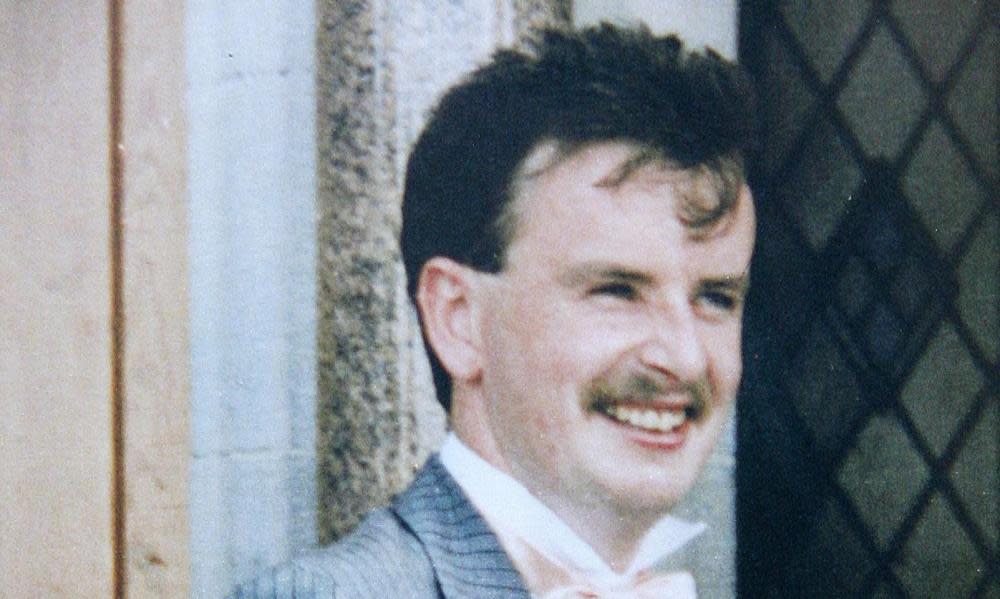Ex-soldier who shot man dead in Northern Ireland faces prosecution

A former soldier who shot dead a 23-year-old man as he walked through a British army checkpoint in Northern Ireland 30 years ago is to be prosecuted for gross negligence manslaughter.
Aidan McAnespie was killed in Aughnacloy, Co Tyrone, on 21 February 1988 while on his way to play football at a local Gaelic Athletic Association club.
The case is being brought against 48-year-old former Grenadier Guardsman David Jonathan Holden after a re-examination of the circumstances of the shooting following a request by McAnespie’s family for a fresh inquest.
McAnespie had just walked through a vehicle checkpoint manned by the Grenadier Guards when he was hit in the back by one of three shots fired from a machine gun in one of the military sangers that, forensic evidence indicated, had ricocheted off the road. He died at the scene.
Holden, aged 18 at the time, was initially charged with manslaughter in 1988 but the charge was later dropped. He had claimed his hands were wet and his finger slipped on the trigger of his heavy machine gun. He was fined for negligent discharge of his weapon and medically discharged from the army.
The decision to now prosecute reportedly hinged on the findings of a fresh ballistics report.
While McAnespie’s family described the decision as “momentous”, Conservative MP for Aldershot, Leo Docherty, who is campaigning for a statute of limitations on cases involving military veterans, called it “madness”.
We need a Statute of Limitations to protect veterans - and soldiers - from this madness https://t.co/P8SDrBxYgd
— Leo Docherty MP (@LeoDochertyUK) June 19, 2018
McAnespie’s brother, Vincent, said: “Today is a momentous result after 30 years of tirelessly campaigning for justice.” The family had faced a “brick wall” and welcomed the decision “to ensure that Guardsman Holden faces justice”.
“He was just an ordinary local lad from the community that just wanted to go about his ordinary everyday life,” he said.
The killing was the subject of a historical enquiries team (HET) review in 2008. The UK government expressed “deep regret” about the killing in 2009.
Northern Ireland’s attorney general, John Larkin, had asked the Public Prosecution Service in 2016 to re-examine the case after reviewing a report into the shooting by the police’s HET.
McAnespie’s family has claimed he had been harassed by the army on previous occasions. A PPS spokeswoman said: “Following careful consideration of all the evidence currently available in the case, and having received advice from senior counsel, it has been decided to prosecute a former soldier for the offence of gross negligence manslaughter.
“That evidence includes further expert evidence in relation to the circumstances in which the general purpose machine gun was discharged, thereby resulting in the ricochet shot which killed Mr McAnespie.”
Immediately after the killing, deputy garda commissioner Eugene Crowley was appointed by the Irish government to compile a report, whose findings have never been published.
Praising the family for their “persistence” in their campaign, Sinn Féin MLA Linda Dillon called for the report to be made public, An Phoblacht website reported.
McAnespie’s cousin, Brian Gormley, said relatives were relieved the circumstances of the case were going to be examined in a court of law. “The opportunity of actually getting to the truth of what happened in this case is still very much alive,” he said. “Unfortunately most of this evidence has been widely available for 30 years, people have chosen not to act on it.”
Holden was reportedly informed of the prosecution decision by email on Tuesday morning, and formal papers will be served on his legal representatives in the coming weeks.
The decision to prosecute after so long was “absolutely horrendous” for the former guardsman, said Docherty, who has a planned adjournment debate on Monday, and is presenting a petition to parliament on Tuesday, both calling for a statue of limitations to protect veterans and serving military from “repeated and spurious” prosecution.
“It is exactly for this kind of case; legacy cases, historical cases,” he said. “We need to draw a line under it.
“Again, we are seeing a historic case dragged up, that is of no public interest. We need a balance in this. Tony Blair issued comfort letters to IRA terrorists and yet we find British veterans, who have previously been cleared of any wrongdoing, hounded into old age.
“The legal pursuit of soldiers and veterans is frankly a national disgrace.”
He said the law of armed conflict and the Geneva conventions had been replaced by human rights legislation. The government needed to look at repealing, or a derogation of aspects of, the Human Rights Act for soldiers deployed in armed conflict,” he added.
Of the decision to prosecute after 30 years, he said: “It is madness. The capacity that this kind of case has to undermine the trust that the military has in the government is very significant. We need to give whole-hearted reassurance to our servicemen and women that they can deploy and not face legal pursuit into old age.”
Darragh Mackin, solicitor for the McAnespie family, said: “Today’s decision is a pivotal step for justice.”

 Yahoo News
Yahoo News 
